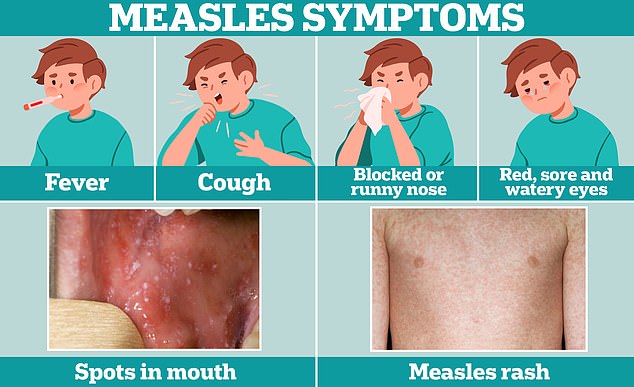Parents rush to jab children against measles: spike in number seeking MMR vaccine after declaration of ‘national incident’ exceeds increase in number of cases
Fears over the measles outbreak have led to a sharp rise in the number of parents looking to catch up with their children, health bosses say.
Dr. Claire Fuller, England’s chief GP, said doctors across the country have reported ‘more people signing up’ for the measles, mumps and rubella (MMR) vaccine.
She also revealed there has been a sevenfold increase in the number of people researching the vaccine on the NHS website.
It comes after the UK’s Health Security Agency declared a ‘national incident’ and called for action amid a worrying rise in cases.
A further 113 suspected cases were reported last week, which is higher than the previous two weeks and brings the total for the year to 258.
In England, 89.3 percent of two-year-olds received their first dose of the MMR vaccine in the year to March 2023 (blue line), compared to 89.2 percent the year before. Meanwhile, 88.7 percent of two-year-olds had both doses, up from 89 percent a year earlier
The cases have been mainly concentrated around London and Birmingham, but officials fear other towns and cities are at risk.
NHS figures show that 3.4 million under-16s in England have not received the necessary two doses of the MMR jab, putting them at risk of the potentially deadly virus.
Dr. Claire Fuller, medical director for primary care at NHS England, said: ‘We’re hearing from GPs that more people are coming forward for a catch-up MMR jab in response to efforts to protect as many people as possible from measles. while visits to the NHS MMR webpage have increased by more than 600 per cent in the last three days – at around one visit every nine seconds.
‘As measles cases increase in parts of the country, it is crucial that we maintain this momentum.’
The NHS says people should check their vaccination history and catch up on any missed doses with their GP or a pop-up clinic.
Amanda Pritchard, chief executive of NHS England, said the outbreak is ‘a real cause for concern’.
She told the BBC: ‘We are seeing a significant increase in the number of children with measles, especially in the West Midlands and London.
“That’s really worrying because it’s such a contagious virus.”
Professor Kamila Hawthorne, president of the Royal College of GPs, said vaccines are the ‘bread and butter’ of GPs’ work, and surgeries are working hard to increase uptake before measles can spread.
She added that the RCGP is also offering training to doctors on how to spot cases of measles and how to talk to parents about any concerns.
Professor Hawthorne said: ‘I haven’t seen a case of measles for 20 years, and many of my younger colleagues haven’t seen a case of measles in their careers.
‘We encourage GPs to do that training, talking about symptoms and what to do if you see a case.’
Pharmacies say they could also help with the vaccination campaign, if the NHS instructed them to do so, as they did with the Covid jab.
Dr. Leyla Hannbeck, chief executive of the Association of Independent Multiple Pharmacies, said: ‘Currently pharmacies do not vaccinate against measles, but it is something they could do if the NHS requests it.
“They are already well trained in vaccination services and provide accessibility and convenience for patients.

Cold symptoms, such as fever, coughing and a runny or stuffy nose, are usually the first sign of measles. A few days later, some people develop small white spots on the inside of their cheeks and the back of their lips. The characteristic rash of measles also develops, usually starting on the face and behind the ears, before spreading to the rest of the body.
‘If it is difficult for many patients to make an appointment at their GP practice, it makes perfect sense to have vaccination services provided by community pharmacies.
‘We wrote to the NHS earlier this week to express our willingness to support this initiative.’
The World Health Organization has said measles is spreading rapidly across Europe, with a 40-fold increase in cases over the past year.
Measles is more contagious than Covid, and 95 percent of the population needs to be vaccinated to protect the wider population through herd immunity.
Less than 85 per cent of five-year-olds in England are fully protected, in some parts of the country this figure is as low as 56 per cent.
One in five children who contract the measles virus require hospital treatment. It can cause serious complications, including encephalitis and pneumonia.
